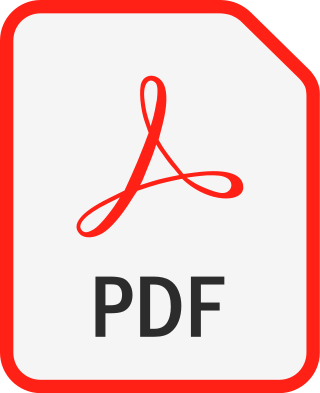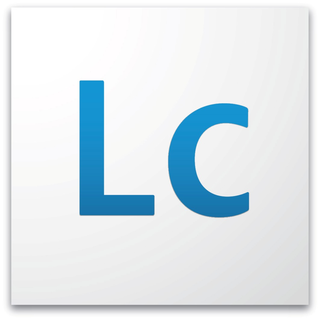
The Dublin Core, also known as the Dublin Core Metadata Element Set (DCMES), is a set of fifteen main metadata items for describing digital or physical resources. The Dublin Core Metadata Initiative (DCMI) is responsible for formulating the Dublin Core; DCMI is a project of the Association for Information Science and Technology (ASIS&T), a non-profit organization.

Portable Document Format (PDF), standardized as ISO 32000, is a file format developed by Adobe in 1992 to present documents, including text formatting and images, in a manner independent of application software, hardware, and operating systems. Based on the PostScript language, each PDF file encapsulates a complete description of a fixed-layout flat document, including the text, fonts, vector graphics, raster images and other information needed to display it. PDF has its roots in "The Camelot Project" initiated by Adobe co-founder John Warnock in 1991. PDF was standardized as ISO 32000 in 2008. The last edition as ISO 32000-2:2020 was published in December 2020.
The Open Archives Initiative Protocol for Metadata Harvesting (OAI-PMH) is a protocol developed for harvesting metadata descriptions of records in an archive so that services can be built using metadata from many archives. An implementation of OAI-PMH must support representing metadata in Dublin Core, but may also support additional representations.
UVC-based preservation is an archival strategy for handling the preservation of digital objects. It employs the use of a Universal Virtual Computer (UVC)—a virtual machine (VM) specifically designed for archival purposes, that allows both emulation and migration to a language-neutral format like XML.
DocuShare is a content management system developed by Xerox Corporation. DocuShare makes use of open standards and allows for managing content, integrating it with other business systems, and developing customized and packaged software applications.
The PBCore metadata standard was created by the public broadcasting community in the United States of America for use by public broadcasters and related communities that manage audiovisual assets, including libraries, archives, independent producers, etc. PBCore is organized as a set of specified fields that can be used in database applications, and it can be used as a data model for media cataloging and asset management systems. As an XML schema, PBCore enables data exchange between media collections, systems and organizations.

Learning Object Metadata is a data model, usually encoded in XML, used to describe a learning object and similar digital resources used to support learning. The purpose of learning object metadata is to support the reusability of learning objects, to aid discoverability, and to facilitate their interoperability, usually in the context of online learning management systems (LMS).
The Extensible Metadata Platform (XMP) is an ISO standard, originally created by Adobe Systems Inc., for the creation, processing and interchange of standardized and custom metadata for digital documents and data sets.
A metadata registry is a central location in an organization where metadata definitions are stored and maintained in a controlled method.
The Metadata Object Description Schema (MODS) is an XML-based bibliographic description schema developed by the United States Library of Congress' Network Development and Standards Office. MODS was designed as a compromise between the complexity of the MARC format used by libraries and the extreme simplicity of Dublin Core metadata.
Geospatial metadata is a type of metadata applicable to geographic data and information. Such objects may be stored in a geographic information system (GIS) or may simply be documents, data-sets, images or other objects, services, or related items that exist in some other native environment but whose features may be appropriate to describe in a (geographic) metadata catalog.

Adobe LiveCycle Enterprise Suite (ES4) is a service-oriented architecture Java EE server software product from Adobe Systems used to build applications that automate a broad range of business processes for enterprises and government agencies. LiveCycle ES4 is an enterprise document and form platform that allows capturing and processing information, delivering personalized communications, and protecting and tracking sensitive information. It is used for purposes such as account opening, services, and benefits enrollment, correspondence management, requests for proposal processes, and other manual-based workflows. LiveCycle ES4 incorporates new features with a particular focus on mobile devices. LiveCycle applications also function in both online and offline environments. These capabilities are enabled through the use of Adobe Reader, HTML/PhoneGap, and Flash Player clients to reach desktop computers and mobile devices.
The Metadata Encoding and Transmission Standard (METS) is a metadata standard for encoding descriptive, administrative, and structural metadata regarding objects within a digital library, expressed using the XML schema language of the World Wide Web Consortium (W3C). The standard is maintained as part of the MARC standards of the Library of Congress, and is being developed as an initiative of the Digital Library Federation (DLF).

NewGenLib is an integrated library management system developed by Verus Solutions Pvt Ltd. Domain expertise is provided by Kesavan Institute of Information and Knowledge Management in Hyderabad, India. NewGenLib version 1.0 was released in March 2005. On 9 January 2008, NewGenLib was declared free and open-source under GNU GPL. The latest version of NewGenLib is 3.1.1 released on 16 April 2015. Many libraries across the globe are using NewGenLib as their Primary integrated library management system as seen from the NewGenlib discussion forum.

Metadata is "data that provides information about other data", but not the content of the data itself, such as the text of a message or the image itself. There are many distinct types of metadata, including:

EPUB is an e-book file format that uses the ".epub" file extension. The term is short for electronic publication and is sometimes styled ePub. EPUB is supported by many e-readers, and compatible software is available for most smartphones, tablets, and computers. EPUB is a technical standard published by the International Digital Publishing Forum (IDPF). It became an official standard of the IDPF in September 2007, superseding the older Open eBook (OEB) standard.
Document Capture Software refers to applications that provide the ability and feature set to automate the process of scanning paper documents or importing electronic documents, often for the purposes of feeding advanced document classification and data collection processes. Most scanning hardware, both scanners and copiers, provides the basic ability to scan to any number of image file formats, including: PDF, TIFF, JPG, BMP, etc. This basic functionality is augmented by document capture software, which can add efficiency and standardization to the process.
Analyzed Layout and Text Object (ALTO) is an open XML Schema developed by the EU-funded project called METAe.
Page Analysis and Ground Truth Elements (PAGE) is an XML standard for encoding digitised documents. Comparable to ALTO (XML), it allows the organisation and structure of a page and its contents to be described.




